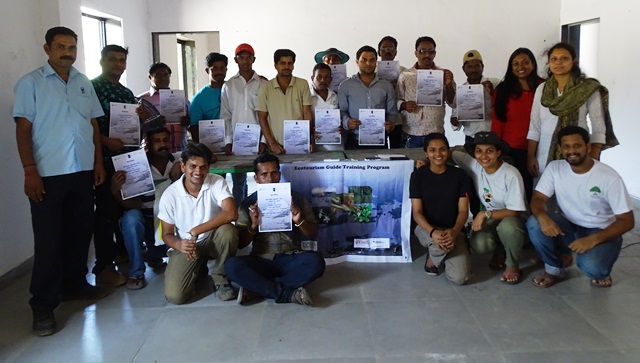28 Mar, 2016
A five day ‘Eco-Tourism Guide Training Programme’ was conducted for 20 fishermen at the Coastal and Marine Biodiversity Park Airoli, Thane Creek, Maharashtra, from 28 March to 1 April, 2016, as part of GIZ’s CMPA project.

The training was conducted by the Mangrove Cell, Government of Maharashtra, GIZ’s CMPA team, Maharashtra, and the Bombay Natural History Society (BNHS)
The training was jointly organised by the Mangrove Cell, Government of Maharashtra, GIZ’s CMPA team, Maharashtra, and the Bombay Natural History Society (BNHS). GIZ’s CMPA project aims to ensure ‘imporved conservation and sustainable use of biodiversity in the pilot protected areas, while taking into consideration the economic circumstances of the local population.'
.jpg)
The Northern area of Thane Creek between Airoli and Vashi bridges was notified as the Thane Creek Flamingo Sanctuary on August 6, 2015, by the Government of Maharashtra
Nestled in the suburbs of Mumbai’s urban jungle is the Thane Creek, which supports a rich diversity of flora and fauna and is one of the work sites of GIZ’s CMPA project. The concerted efforts of the Mangrove Cell, Government of Maharashtra and GIZ are directed towards ensuring that mangroves are cherished as sentinels of Mumbai’s shoreline. Significantly, Northern area of Thane Creek between Airoli and Vashi bridges was notified as the 'Thane Creek Flamingo Sanctuary' on August 6, 2015, by the Government of Maharashtra. The CMPA Project is also supporting the Maharashtra Mangrove Cell in developing a scientific management plan for the sanctuary.
.jpg)
Discussion with the participants regarding the aims and objectives of the training
.jpg)
BNHS staff explaining the participants about the ethics of eco-tourism

The participants were taught how to identify various species of birds
The training included various indoor and outdoor activities, presentations, as well as talks about biodiversity, bird diversity, and mangrove diversity. Boat rides were conducted and participants were taught to identify birds. Interesting facts about the species seen were also shared. Participants were provided with resource materials both in English and Marathi. These included a bird guide, mangrove guide, guide about commonly found shells and a book about the Marathi names of birds of Maharashtra.
.jpg)
.jpg)
Distribution of certificates by Ms. Supriya Jhunjhunwala, Adviser GIZ, and Ms. Nishigandha Pednekar, Executive assistant- Director and HR, Bombay Natural History Society
Another important aspect of the training included conservation ethics for ecotourism. Participants were trained to share general do’s and don’ts about wildlife tourism with tourists. They were also trained to handle various types of tourists through role play and mock demonstration. A quiz was also conducted on the last day to assess the impact of the training and to check their knowledge about birds, gained during the training programme. Most participants were able to identify the common birds and mangrove species found in and around the creek after the training. The training ended with distribution of certificates to all the participants.
(1).jpg)
Photo credits Ms. Supriya Jhunjhunwala and BNHS
© 2014 IGBP. All Rights Reserved.
Site By: Virtualpages
